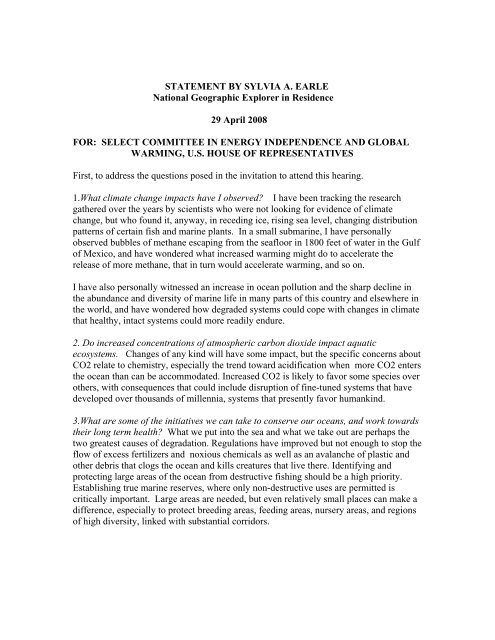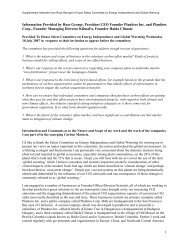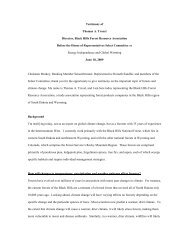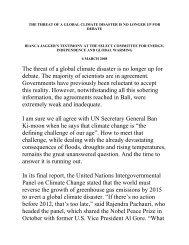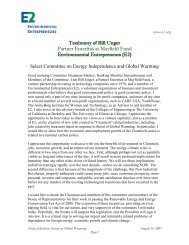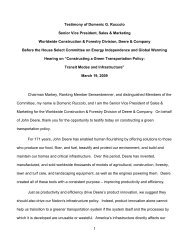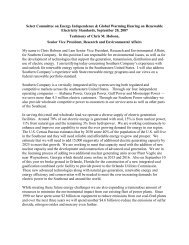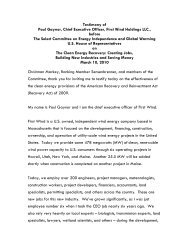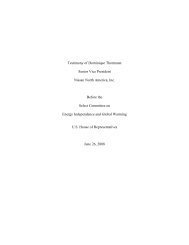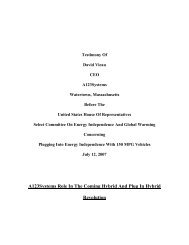Sylvia Earle - The Select Committee for Energy Independence and ...
Sylvia Earle - The Select Committee for Energy Independence and ...
Sylvia Earle - The Select Committee for Energy Independence and ...
Create successful ePaper yourself
Turn your PDF publications into a flip-book with our unique Google optimized e-Paper software.
STATEMENT BY SYLVIA A. EARLE<br />
National Geographic Explorer in Residence<br />
29 April 2008<br />
FOR: SELECT COMMITTEE IN ENERGY INDEPENDENCE AND GLOBAL<br />
WARMING, U.S. HOUSE OF REPRESENTATIVES<br />
First, to address the questions posed in the invitation to attend this hearing.<br />
1.What climate change impacts have I observed? I have been tracking the research<br />
gathered over the years by scientists who were not looking <strong>for</strong> evidence of climate<br />
change, but who found it, anyway, in receding ice, rising sea level, changing distribution<br />
patterns of certain fish <strong>and</strong> marine plants. In a small submarine, I have personally<br />
observed bubbles of methane escaping from the seafloor in 1800 feet of water in the Gulf<br />
of Mexico, <strong>and</strong> have wondered what increased warming might do to accelerate the<br />
release of more methane, that in turn would accelerate warming, <strong>and</strong> so on.<br />
I have also personally witnessed an increase in ocean pollution <strong>and</strong> the sharp decline in<br />
the abundance <strong>and</strong> diversity of marine life in many parts of this country <strong>and</strong> elsewhere in<br />
the world, <strong>and</strong> have wondered how degraded systems could cope with changes in climate<br />
that healthy, intact systems could more readily endure.<br />
2. Do increased concentrations of atmospheric carbon dioxide impact aquatic<br />
ecosystems. Changes of any kind will have some impact, but the specific concerns about<br />
CO2 relate to chemistry, especially the trend toward acidification when more CO2 enters<br />
the ocean than can be accommodated. Increased CO2 is likely to favor some species over<br />
others, with consequences that could include disruption of fine-tuned systems that have<br />
developed over thous<strong>and</strong>s of millennia, systems that presently favor humankind.<br />
3.What are some of the initiatives we can take to conserve our oceans, <strong>and</strong> work towards<br />
their long term health? What we put into the sea <strong>and</strong> what we take out are perhaps the<br />
two greatest causes of degradation. Regulations have improved but not enough to stop the<br />
flow of excess fertilizers <strong>and</strong> noxious chemicals as well as an avalanche of plastic <strong>and</strong><br />
other debris that clogs the ocean <strong>and</strong> kills creatures that live there. Identifying <strong>and</strong><br />
protecting large areas of the ocean from destructive fishing should be a high priority.<br />
Establishing true marine reserves, where only non-destructive uses are permitted is<br />
critically important. Large areas are needed, but even relatively small places can make a<br />
difference, especially to protect breeding areas, feeding areas, nursery areas, <strong>and</strong> regions<br />
of high diversity, linked with substantial corridors.
General Comments <strong>Sylvia</strong> A. <strong>Earle</strong><br />
Perhaps the greatest concern about climate change is that many people are not taking it<br />
seriously, <strong>and</strong> many others are not taking it seriously enough. To deal with a problem, it<br />
is necessary to first recognize that it exists. <strong>The</strong> United States can help by making<br />
climate change issues priority issues, including actions that can help stabilize <strong>and</strong><br />
reverse the troubling trends.<br />
Climate change is real, of course. Not only is change natural <strong>and</strong> inevitable, but owing to<br />
human actions over the ages, especially during the 20 th <strong>and</strong> now the 21 st centuries, the<br />
rate of change has accelerated significantly.<br />
Most worrisome, perhaps, is the accelerated warming trend caused by excess greenhouse<br />
gases, notably carbon dioxide, that we have released into the atmosphere. <strong>The</strong> United<br />
States can help by supporting policies that will reduce CO2 emissions sharply <strong>and</strong><br />
swiftly.<br />
<strong>The</strong>re should be a moratorium on cutting whatever old growth <strong>for</strong>ests remain, wherever<br />
they are in the country, partly to maintain the irreplaceable diversity contained there.<br />
Maintaining the highest possible biodiversity is like writing an insurance policy against<br />
the negative consequences of climate change. <strong>The</strong> greater the diversity, the better the<br />
chances that some species will prosper <strong>and</strong> adapt to the new circumstances.<br />
Protecting <strong>for</strong>ests benefits watersheds <strong>and</strong> rivers that inexorably flow into the sea.<br />
Healthier l<strong>and</strong>scapes yield healthier seascapes.<br />
Moreover, intact <strong>for</strong>ests store carbon; logged or burned <strong>for</strong>ests release it to the<br />
atmosphere as CO2 <strong>and</strong> methane. <strong>The</strong> same is true of ocean ecosystems. Kelp <strong>for</strong>ests<br />
<strong>and</strong> coral reefs sequester carbon; dead or damaged systems release carbon. Fish <strong>and</strong><br />
other <strong>for</strong>ms of ocean life are carbon-based units that represent an enormous living<br />
store-house <strong>for</strong> carbon – as long as it remains in the sea. Wildlife taken from <strong>for</strong>ests as<br />
bushmeat <strong>and</strong> the hundred million or so tons of wildlife taken annually from the sea<br />
diminish the resilience of their respective systems <strong>and</strong> put stored carbon into play.<br />
Increased temperature brings with it a host of concerns. Plants <strong>and</strong> animals typically<br />
occupy a fairly narrow span of temperature that is suitable <strong>for</strong> their particular species.<br />
Some like it hot; some like it cold. Even small temperatures can have profound<br />
consequences <strong>for</strong> organisms that do not have our capacity to modify the environment to<br />
suit themselves. Some can migrate, but the ecosystems upon which individual species<br />
depend cannot migrate enmasse. As migrating species move into new territories, they<br />
may displace <strong>and</strong> disrupt other species <strong>and</strong> undermine entire systems. <strong>The</strong> United States<br />
can help by supporting policies to swiftly <strong>and</strong> sharply increase protection <strong>for</strong> natural<br />
systems, including <strong>for</strong>ests <strong>and</strong> ocean ecosystems, <strong>and</strong> the diverse <strong>for</strong>ms of life they<br />
support.
\As the ocean warms, there is concern that frozen methane now abundant <strong>and</strong> widespread<br />
in the deep sea may be released, enhancing the greenhouse effect, <strong>and</strong> speeding up the<br />
warming trend, <strong>and</strong> thus increasing the release of more methane – a classic feedback<br />
loop. Moreover, increasing warmth will cause the release of methane from the nowfrozen<br />
permafrost in the Arctic’s tundra, with similar feed-back consequences. <strong>The</strong><br />
United States can help by acknowledging the importance of methane in global warming<br />
<strong>and</strong> recognize the need to view climate change with an enhanced sense of urgency.<br />
<strong>The</strong> results of global warming include the melting of polar <strong>and</strong> alpine ice leading to sea<br />
level rise, another natural process that is accelerating, with impact most obvious in<br />
densely populated coastal areas worldwide. Today’s children <strong>and</strong> the majority of adults<br />
will experience the consequences. <strong>The</strong> United States can take the lead in helping prepare<br />
people <strong>for</strong> how to deal with this in a timely manner.<br />
Sadly, while the ocean provides the foundation <strong>for</strong> all of the planet’s systems – driving<br />
climate <strong>and</strong> weather, stabilizing temperature, taking up <strong>and</strong> holding carbon dioxide from<br />
the atmosphere, generating oxygen, shaping global chemistry, providing home <strong>for</strong> most<br />
of life on Earth – the ocean is being largely ignored by most of those who have been<br />
working on climate change issues. One of the most important <strong>and</strong> positive things that the<br />
United States can do to prepare <strong>for</strong> the consequences of climate change is to recognize<br />
the role of the ocean, <strong>and</strong> take all possible measures to protect that vast but vulnerable<br />
system that governs the way the world works.<br />
Recognizing that the ocean’s wildlife – the fish, the whales, the kelp, the crabs, the<br />
krill, the sharks, the urchins <strong>and</strong> starfish, the coral reefs <strong>and</strong> deep sea <strong>for</strong>ests of coral – are<br />
all components of our life support system, it is truly alarming that in just a few decades,<br />
these vital natural treasures are in serious trouble.<br />
Viewed from afar, Earth comes into focus as the one <strong>and</strong> only World Bank, the natural<br />
asset base that humankind relies upon <strong>for</strong> all that matters to us.<br />
Our overfishing <strong>and</strong> use of trawls, draggers, longlines <strong>and</strong> other destructive gear have<br />
cost us dearly. Ninety per cent of the big fish are gone – sharks, swordfish, tunas, cod,<br />
marlin, groupers, snappers, <strong>and</strong> many more. Hundreds of thous<strong>and</strong>s of marine mammals<br />
<strong>and</strong> seabirds as well as numerous sea turtles are killed as bycatch every year. Critical<br />
habitats, from mangrove <strong>for</strong>ests to sea grass meadows to coral reefs <strong>and</strong> deep sea<br />
mountains have been devastated -- with perverse subsidies helping to underwrite the<br />
destruction.<br />
<strong>The</strong> good news is that some coral reefs are still in reasonably good shape. <strong>The</strong>re is still a<br />
chance <strong>for</strong> blue-fin tunas <strong>and</strong> blue whales, <strong>for</strong> cod <strong>and</strong> corals <strong>and</strong> deep sea crabs. But<br />
only if we underst<strong>and</strong> that alive they are critically important to the health of the ocean,<br />
<strong>and</strong> there<strong>for</strong>e to our health. If the ocean is at risk – <strong>and</strong> it is – then so are we. If the<br />
ocean is in trouble, so are we. By taking care of the ocean, we are taking care of<br />
ourselves.
An opportunity was missed in 2007 when the United States joined with most other<br />
countries to establish a moratorium on bottom trawling in the High Seas, a<br />
recommendation to the United Nations that was narrowly defeated. How does this relate<br />
to climate change issues? It seems simple enough. During a time when the world is<br />
undergoing changes unprecedented in the history of humankind, the last thing that we<br />
should be doing is to go about disrupting stable, diverse, natural systems that may be<br />
critical in holding the planet steady as temperature swings, currents change, <strong>and</strong> living<br />
systems try to adapt to new circumstances.<br />
Trawling the ocean floor is comparable to bulldozing <strong>for</strong>ests <strong>for</strong> songbirds, Despite the<br />
Enormous destruction, most of the deep sea has been beyond our reach until now. <strong>The</strong>re<br />
is only one chance to keep the deep sea ecosystems from severe trauma. Once trawled,<br />
the distillation of millions of years of fine-tuning is lost. <strong>The</strong> United States could take<br />
actions necessary to stabilize ocean ecosystems: curb overfishing <strong>and</strong> destructive fishing<br />
practices, <strong>and</strong> stop using the ocean as a place to dump wastes.<br />
<strong>The</strong> blue heart of the planet is choked with plastic <strong>and</strong> other debris. Even more<br />
troubling is the other big problem with carbon dioxide. <strong>The</strong> ocean takes up a lot, but so<br />
much as been generated so fast that there is an excess of CO2 in the ocean, CO2 that<br />
converts to carbonic acid. <strong>The</strong> ocean has been trending toward acidification in recent<br />
years. That is bad <strong>for</strong> coral reefs, sea snails, clams, the planktonic young of many<br />
creatures, as well as the small green organisms with carbonate shells that dissolve in<br />
acidic water. No longer can they take carbon out of the atmosphere, generate oxygen, or<br />
produce food <strong>for</strong> other creatures.<br />
<strong>The</strong>re are many reasons <strong>for</strong> the United States to be optimistic, to consider the powerful<br />
influence this country can have on the rest of the world by setting the right example, as<br />
well as providing help in blunting the sharp edge of climate change impact. Many feel<br />
helpless <strong>and</strong> there<strong>for</strong>e hopeless.<br />
<strong>The</strong>re is time, but no time to waste.<br />
<strong>The</strong> next ten years may be the most important in the next ten thous<strong>and</strong> years because of<br />
what we do – or fail to do – concerning climate change. As never again, we have a<br />
chance, <strong>and</strong> you who represent this country have a unique opportunity to promote actions<br />
That will protect all that we hold near <strong>and</strong> dear – our health, our wealth, our security, our<br />
very lives, <strong>and</strong> the lives of all who follow.


